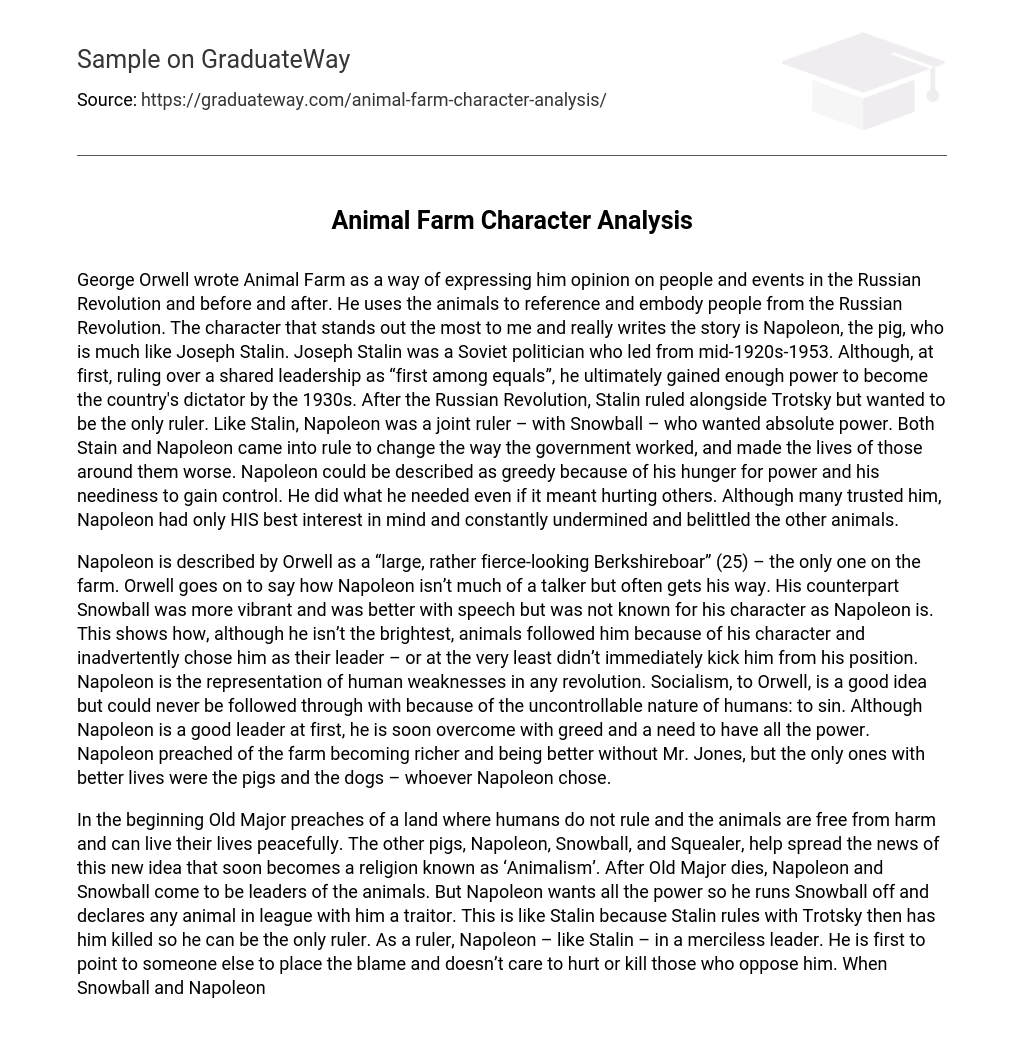George Orwell wrote Animal Farm as a way of expressing him opinion on people and events in the Russian Revolution and before and after. He uses the animals to reference and embody people from the Russian Revolution. The character that stands out the most to me and really writes the story is Napoleon, the pig, who is much like Joseph Stalin. Joseph Stalin was a Soviet politician who led from mid-1920s-1953. Although, at first, ruling over a shared leadership as “first among equals”, he ultimately gained enough power to become the country’s dictator by the 1930s. After the Russian Revolution, Stalin ruled alongside Trotsky but wanted to be the only ruler. Like Stalin, Napoleon was a joint ruler – with Snowball – who wanted absolute power. Both Stain and Napoleon came into rule to change the way the government worked, and made the lives of those around them worse. Napoleon could be described as greedy because of his hunger for power and his neediness to gain control. He did what he needed even if it meant hurting others. Although many trusted him, Napoleon had only HIS best interest in mind and constantly undermined and belittled the other animals.
Napoleon is described by Orwell as a “large, rather fierce-looking Berkshireboar” (25) – the only one on the farm. Orwell goes on to say how Napoleon isn’t much of a talker but often gets his way. His counterpart Snowball was more vibrant and was better with speech but was not known for his character as Napoleon is. This shows how, although he isn’t the brightest, animals followed him because of his character and inadvertently chose him as their leader – or at the very least didn’t immediately kick him from his position. Napoleon is the representation of human weaknesses in any revolution. Socialism, to Orwell, is a good idea but could never be followed through with because of the uncontrollable nature of humans: to sin. Although Napoleon is a good leader at first, he is soon overcome with greed and a need to have all the power. Napoleon preached of the farm becoming richer and being better without Mr. Jones, but the only ones with better lives were the pigs and the dogs – whoever Napoleon chose.
In the beginning Old Major preaches of a land where humans do not rule and the animals are free from harm and can live their lives peacefully. The other pigs, Napoleon, Snowball, and Squealer, help spread the news of this new idea that soon becomes a religion known as ‘Animalism’. After Old Major dies, Napoleon and Snowball come to be leaders of the animals. But Napoleon wants all the power so he runs Snowball off and declares any animal in league with him a traitor. This is like Stalin because Stalin rules with Trotsky then has him killed so he can be the only ruler. As a ruler, Napoleon – like Stalin – in a merciless leader. He is first to point to someone else to place the blame and doesn’t care to hurt or kill those who oppose him. When Snowball and Napoleon run into a disagreement Napoleon chooses to run Snowball off instead of compromising and working together. Napoleon gets the animals to work themselves to the bone and fight in their battle while he is too coward and lazy to do himself.
Napoleon, although quiet, becomes the leader because of how manipulative he is. He operates through disloyalty and nastiness. He often betrays those who are loyal to him and runs the farm through fear. He is guarded by 9 large dogs that he had taken from their parents. He raised the to follow his every command and be cruel just like him. Napoleon’s biggest fault is his complete change into Jones — though Napoleon is a much more strict and demanding master than we are led to believe Jones ever was. By the end of the novel, Napoleon is doing what humans do I their homes: eating from plates, sleeping in the bed, drinking, trading with other farmers, and walking on two legs.





